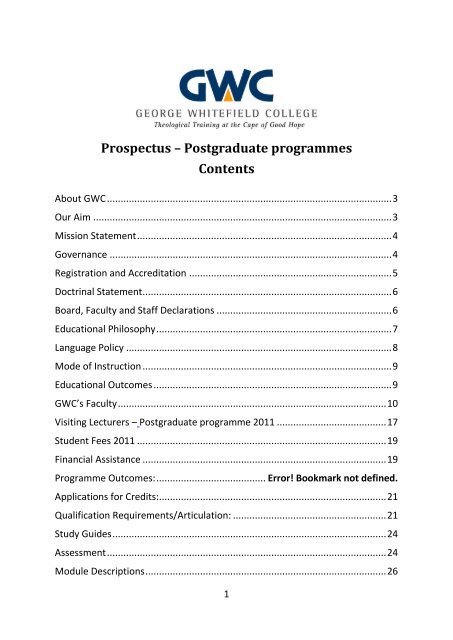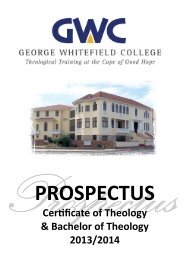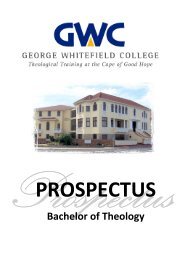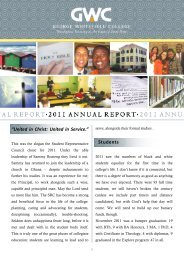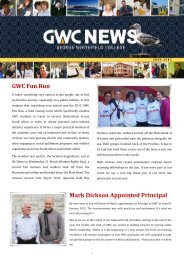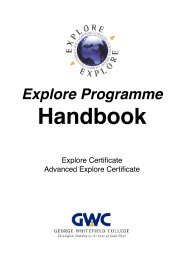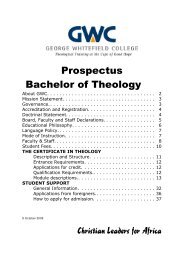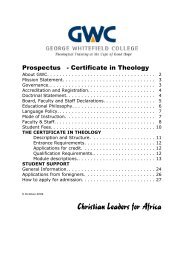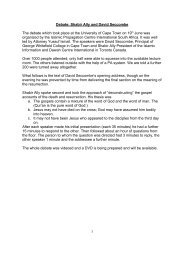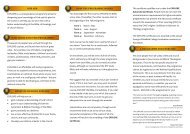Prospectus ? Postgraduate programmes Contents - George ...
Prospectus ? Postgraduate programmes Contents - George ...
Prospectus ? Postgraduate programmes Contents - George ...
You also want an ePaper? Increase the reach of your titles
YUMPU automatically turns print PDFs into web optimized ePapers that Google loves.
<strong>Prospectus</strong> – <strong>Postgraduate</strong> <strong>programmes</strong><br />
<strong>Contents</strong><br />
About GWC ........................................................................................................ 3<br />
Our Aim ............................................................................................................. 3<br />
Mission Statement ............................................................................................. 4<br />
Governance ....................................................................................................... 4<br />
Registration and Accreditation .......................................................................... 5<br />
Doctrinal Statement ........................................................................................... 6<br />
Board, Faculty and Staff Declarations ................................................................ 6<br />
Educational Philosophy ...................................................................................... 7<br />
Language Policy ................................................................................................. 8<br />
Mode of Instruction ........................................................................................... 9<br />
Educational Outcomes ....................................................................................... 9<br />
GWC’s Faculty .................................................................................................. 10<br />
Visiting Lecturers – <strong>Postgraduate</strong> programme 2011 ........................................ 17<br />
Student Fees 2011 ........................................................................................... 19<br />
Financial Assistance ......................................................................................... 19<br />
Programme Outcomes: ........................................ Error! Bookmark not defined.<br />
Applications for Credits: ................................................................................... 21<br />
Qualification Requirements/Articulation: ........................................................ 21<br />
Study Guides .................................................................................................... 24<br />
Assessment ...................................................................................................... 24<br />
Module Descriptions ........................................................................................ 26<br />
1
STUDENT SUPPORT SERVICES .......................................................................... 29<br />
Student Council ............................................................................................ 29<br />
Campus ........................................................................................................ 29<br />
Daily Programme ......................................................................................... 29<br />
Library and Information Services ................................................................. 30<br />
Bookshop ..................................................................................................... 30<br />
Practical Training ......................................................................................... 30<br />
Language School .......................................................................................... 30<br />
Commencement Camp ................................................................................ 31<br />
Skills Development ....................................................................................... 31<br />
Applications from foreigners............................................................................ 32<br />
How to apply for admission ............................................................................. 33<br />
2
About GWC<br />
GWC’s beginnings stem from 1977 with the establishment of <strong>George</strong><br />
Whitefield House as a resource and support centre for students of the Church<br />
of England in South Africa (CESA) who were then training for ministry at the<br />
Bible Institute of South Africa in Kalk Bay, Cape Town. The Rev David Streater<br />
(later Secretary of the Church Society in London) was appointed as the first<br />
Warden and he was succeeded by the Rev Dr John Newby (later Vice-Principal<br />
of GWC). In 1988 the Rev Dr David Broughton Knox came from Australia at the<br />
request of the CESA Synod to establish <strong>George</strong> Whitefield College. GWC was<br />
located close to the Bible Institute in Kalk Bay and the two colleges worked in<br />
association from 1989 until 1998 when GWC outgrew its premises and moved<br />
to Muizenberg.<br />
Dr Broughton Knox brought vast experience and knowledge from a long<br />
association with Australia’s Moore Theological College, including 27 years as its<br />
Principal. Consistent with the theological stance of the CESA, he laid the<br />
foundations for an evangelical and reformed training of candidates for the<br />
Christian ministry, as well as Scripturally-based instruction in Christian life and<br />
ministry for the wider community.<br />
In 1993 Dr Knox was succeeded by the Rev Dr David Seccombe and under his<br />
leadership GWC has seen rapid expansion. The College is now firmly<br />
established as a high quality institution with a growing reputation in Africa and<br />
the rest of the world. New <strong>programmes</strong>, such as the unique Children’s Worker<br />
track, have been added and the existing curricula improved. Student numbers<br />
have increased and the College now attracts students from all over the world<br />
and especially other countries in Africa.<br />
Our Aim<br />
GWC stands under the authority of Holy Scripture as God’s infallible<br />
revelation of himself to human beings, culminating in his becoming a man<br />
in Jesus Christ. Our programme therefore aims to deepen the students’<br />
understanding of the total message of the Bible, to develop their capacity<br />
to relate to the many complex situations of modern life, and to train<br />
them to minister the biblical message effectively to the needy world.<br />
3
Mission Statement<br />
<strong>George</strong> Whitefield College (GWC) exists to play its’ part in fulfilling the terms of<br />
Christ's Great Commission 1 by educating people in the principles of Christian<br />
knowledge 2 , and providing high quality education and training for Christian life<br />
and ministry, particularly ministries of the Word of God.<br />
1<br />
To disciple the nations and teach them everything that Christ enjoined upon his apostles.<br />
(Matthew 28:19)<br />
2<br />
The knowledge of God and related fields of knowledge.<br />
Governance<br />
<strong>George</strong> Whitefield College is an association incorporated under section 21 of<br />
the Companies Act, 1973 (Registration number: 2003/003197/08). Ultimate<br />
control of the College is vested in the GWC Board of Directors.<br />
The Board consists of:<br />
The Presiding Bishop of the CESA,<br />
The Principal of the College,<br />
Two Rectors of CESA churches, elected by the CESA Synod<br />
Five lay members, being CESA members.<br />
The present Board Members are:<br />
Bishop Desmond Inglesby, Presiding Bishop of the CESA<br />
The Rev Prof. David Seccombe, Principal of GWC<br />
Mr Ashley Croeser, Businessman<br />
The Rev Dr Mervyn Eloff, Rector, St James Church, Kenilworth<br />
Dr Jerry Gule, Businessman<br />
The Rev Dr Mark Norman, Rector, CESA Queenswood, Pretoria<br />
Prof Rob Sieborger, Associate Professor, School of Education, UCT.<br />
Mrs Hayley-Lee Tubman, Homemaker.<br />
Responsibility for academic matters is vested in the Faculty Board which<br />
consists of all full-time faculty members - see page 8.<br />
Responsibility for all other day-to-day college matters (finance, property,<br />
resources, etc) is vested in the Executive Committee, consisting of:<br />
Dr David Seccombe Principal and Chief Executive<br />
The Rev Mark Dickson Vice-principal<br />
Mr Alan Beckman Academic Registrar<br />
Mr Arnie Muller Business Manager<br />
Mr Roderick Hoek Development Manager<br />
4
Registration and Accreditation<br />
<strong>George</strong> Whitefield College is registered with the Department of Higher<br />
Education and Training as a private higher education institution in terms of<br />
section 54(1)(c) of the Higher Education Act (Act No 101 of 1997) and<br />
Regulation 16(4)(a) of the Regulations for the Registration of Private Higher<br />
Education Institutions, 2002. The college offers accredited undergraduate<br />
<strong>programmes</strong> in terms of this registration.<br />
<strong>Postgraduate</strong> <strong>programmes</strong>:<br />
The following postgraduate <strong>programmes</strong> are offered in terms of a co-operation<br />
agreement with North-West University, Potchefstroom campus:<br />
Honours Bachelor of Arts (Theology).<br />
Master of Arts (Theology).<br />
Doctorates<br />
GWC offers an excellent support system for evangelical doctoral candidates.<br />
Candidates may enrol at any university and join our <strong>Postgraduate</strong> Research<br />
Fellowship. Students accepted into the Fellowship enjoy all the benefits of the<br />
GWC facilities, including the library and study centre. Accommodation can also<br />
be arranged if available. PhD students are also invited to attend and present<br />
seminars, participate in study groups, and generally profit from interaction<br />
with other evangelical students and the GWC Faculty. Prospective students<br />
are advised to research the best university option for them and make<br />
application in terms of the particular university’s rules. In need, the GWC Dean<br />
of <strong>Postgraduate</strong> Studies and the GWC Faculty may be asked for advice and<br />
facilitation (particularly with North-West University), but the application<br />
process is the student’s responsibility. In the normal course, application to the<br />
GWC Fellowship will follow acceptance by the university but it may be possible<br />
to do this simultaneously.<br />
5
Doctrinal Statement<br />
At <strong>George</strong> Whitefield College we believe that God has revealed himself and his<br />
plan for the human race through the prophetic writings of the Old and New<br />
Testaments, and ultimately by becoming a man in the person of Jesus Christ.<br />
At the heart of this plan is God’s establishment of Jesus Christ as Lord and King<br />
of his Universe through his sin-bearing death and death-defeating resurrection.<br />
Jesus commanded that this be communicated to people of all nations that they<br />
might believe and be saved, before his coming again to rule visibly, gloriously<br />
and for ever. Salvation is by Christ’s grace alone, and is received by faith alone.<br />
Believers become members of Christ (“in Christ”) and this determines their<br />
fundamental corporate identity, transcending all differences of nationality,<br />
race, gender and class. As Christians, we are one body in Christ and individually<br />
children of God and brothers and sisters to each other.<br />
Board, Faculty and Staff Declarations<br />
Board members and Faculty of GWC make the following declaration prior to<br />
taking office:<br />
I believe and hold the Christian faith and in particular, as set forth in the creeds<br />
known as the Nicene Creed and the Apostles’ Creed and the doctrine contained<br />
in the Thirty-nine Articles of Religion* interpreted according to their plain and<br />
literal sense.<br />
In particular, I believe:<br />
that the canonical Scriptures of the Old and New Testaments are the<br />
ultimate rule and standard of faith given by inspiration of God and<br />
containing all things necessary to salvation; and<br />
that man is justified before God only because of the merit of our Lord<br />
and Saviour Jesus Christ by faith and not because of his own works or<br />
merit.<br />
*The Thirty-Nine Articles of Religion are the statement of faith subscribed to by ministers of the Church of<br />
England in South Africa and other Anglican denominations throughout the world. They may be found at the back<br />
of most Anglican Prayer Books.<br />
6
Recognising the sensitivities of its South African context, Faculty and staff at<br />
GWC sign the following declaration:<br />
As teachers and staff at <strong>George</strong> Whitefield College we believe that Christ<br />
welcomes to his kingdom men, women and children of all races and<br />
nationalities as equals in Christ. We therefore commit ourselves to:<br />
• praying for one another: students, faculty and staff.<br />
• working for the upliftment and progress of the students of the College,<br />
whatever their race or gender.<br />
• being fair and even-handed in all our dealings with the students.<br />
• being respectful and courteous to everyone in the College, regardless of<br />
race, gender or position.<br />
Educational Philosophy<br />
Foundational to GWC’s educational method is the conviction that the Bible is<br />
God’s Word and that teaching God’s Word is the core of Christian ministry.<br />
Much attention is given, therefore, to the study of the Bible, which is a<br />
foundational text book and primary source. This entails attention to the<br />
original languages in which the Bible was written, and its historical, cultural,<br />
and literary background. It also entails study of the systematic formalization of<br />
the doctrines and ethical teachings of the Bible.<br />
GWC is also appreciatively aware of the rich Christian heritage of thought,<br />
worship, life and ministry to which it is heir, and is active in understanding,<br />
critically assessing and preserving this tradition. This entails critical study of the<br />
history of (Judaeo) Christian belief and practice, including the controversies,<br />
past and present, which need to be understood and evaluated.<br />
Ministry skills are best learned by doing. GWC provides certain workshops of a<br />
practical nature in its regular curriculum, but also requires that students<br />
undertake supervised field work.<br />
7
In addition to a rigorous application to mastering the knowledge,<br />
understanding and skills base of the Christian Faith, we seek as broad and deep<br />
an understanding of the philosophies, religions and cultures of the world we<br />
live in as is possible within the time constraints of the courses.<br />
God has revealed himself in order that we might know him, enjoy him and<br />
serve him, so our teaching and learning takes place in a context of faith and<br />
commitment - “faith seeking understanding of itself” (Anselm). This aspect of<br />
our educational method expresses itself in<br />
• a culture of consciously and deliberately learning from Christ.<br />
• the evangelical commitment of teachers.<br />
• the Christian commitment of the students.<br />
• a mutual concern for spiritual growth amongst students, teachers and<br />
staff.<br />
• worship, prayer and fellowship within the formal and informal life of the<br />
College.<br />
Language Policy<br />
The primary teaching and learning mode at GWC is through contact lectures in<br />
the English language. It is therefore necessary for prospective students to be<br />
proficient in English - reading, writing and comprehension. The college<br />
reserves the right to require a language examination of its choice as a<br />
prerequisite to admission.<br />
Foreign students who have English as a second language may be required to<br />
complete a TOEFKL test (or similar) to prove proficiency in English at a level<br />
suitable for academic study. The requirement is IELTS - 6.5 overall and 6.0 for<br />
the written element. This is equivalent to 232 in the computerised TOEFL test,<br />
575 in the written TOEFL test or 90 - 91 in the internet based TOEFL test.<br />
Equivalent English language qualifications may be accepted. The following link<br />
will enable you to find out more about the IELTS and TOEFL tests and will<br />
enable you to locate a learning & testing centre near to where you<br />
live. http://www.ets.org/portal/site/ets/menu<br />
8
Mode of Instruction<br />
The main mode of instruction is through contact lectures held between 08:00<br />
to 15:30 Mondays to Fridays - please see the calendar for details of the college<br />
academic year and terms. Timetables are published in advance of each term<br />
giving details of classes and venues. Wherever possible, afternoon lectures are<br />
avoided.<br />
Christian ministry is best learnt not from books and lectures alone, but through<br />
a dynamic interaction with people. The programme therefore includes a field<br />
work component, regular chapel services and other opportunities to practise<br />
skills learnt. There is also time for unstructured interaction - a weekly college<br />
lunch, coffee times, fellowship groups, etc.<br />
Educational Outcomes<br />
A GWC graduate<br />
should<br />
love God and neighbour and express it in service and prayer.<br />
know and understand the Bible.<br />
be able to:<br />
interpret the Bible accurately and responsibly.<br />
explain and defend the truths and practices of the Christian Faith.<br />
carry out practical Christian ministry, especially the teaching and<br />
preaching of God’s Word.<br />
9
GWC’s Faculty<br />
David Seccombe PRINCIPAL<br />
Christian Doctrine, New Testament<br />
BSc Hons (University of New England), LTh Hons (Moore College & Australian College of<br />
Theology), BD Hons (London University), Diploma of Religious Education (Melbourne<br />
College of Divinity), PhD (Cambridge University).<br />
David is Principal of GWC. His PhD dissertation is published as<br />
Possessions and the Poor in Luke-Acts (Linz: SNTU, 1982). Other<br />
books include Dust to Destiny: Reading Romans Today (Sydney:<br />
Aquila, 1996), The King of God's Kingdom: A Solution to the<br />
Puzzle of Jesus (Carlisle: Paternoster, 2002). Formerly Rector of St<br />
Matthew's Anglican Church in Shenton Park, Western Australia<br />
(1979 - 1992), he was appointed Principal of GWC in 1993. He is<br />
an Affiliate Professor of New Testament at North-West<br />
University. David is married to Lorraine and they have a son and three daughters.<br />
Mark Dickson VICE-PRINCIPAL Biblical Hebrew, Philosophy<br />
BSc (Major: Physics) (UCT), Dip Th (BISA), MA (NWU)<br />
Mark is Vice-Principal and holds the C.S. Lewis Lectureship in<br />
Christian Thought. He is especially interested in grappling with<br />
foundational truths of the Christian Faith, applying and packaging<br />
them to address the issues of modern society, and has special<br />
expertise in the area of science and Christianity. Mark was the<br />
senior minister of St Matthews Church in Table View (Cape Town)<br />
for 17 years, and is still actively involved in ministry there. He is<br />
married to Julie and they have two sons and a daughter. Mark’s MA dissertation is<br />
entitled Irreducible complexity as a nexus for an interdisciplinary dialogue between<br />
machine logic, molecular biology and theology. He is on sabbatical leave during 2011<br />
and engaged in PhD studies.<br />
10
Alan Beckman ACADEMIC REGISTRAR Church History<br />
LTh (BISA), Grad GWC, MA (Church & Dogma History) (NWU).<br />
Alan serves as Academic Registrar. He is a former bank manager<br />
who graduated from GWC in 1990 and was appointed as<br />
Administrator of the fledgling college under the first principal, Dr<br />
Broughton Knox. From the outset he has also lectured in a range of<br />
subjects. A lifelong Anglican, his research is in the area of Anglican<br />
history. His MA dissertation is entitled A clash of churchmanship:<br />
Robert Gray & the Evangelical Anglicans. Alan is married to Marilyn and they have<br />
two sons, a daughter and six grandchildren. He enjoys hiking, reading, history<br />
(particularly local history) and trying to solve cryptic crosswords.<br />
Victor Owuor DEAN OF STUDENTS Biblical Studies<br />
Dip.Th (Moffatt College), LTh (ESSA), BA Hons (Potchefstroom), MA (NWU).<br />
Victor is Dean of Students and lecturer in Biblical Studies. He was<br />
appointed to the GWC faculty in 2007. He ministered as a pastor<br />
in a congregation of over 700 regular attendants in Kisumu, Kenya<br />
for four years, as well as lecturing part time at Ahero Evangelical<br />
School of Theology. He has published The Gospel in Africa: A<br />
Survey of African Theology from the 1960s to 2000. His MA<br />
dissertation is entitled Resurrection Hope in the African Context:<br />
Challenging Luo beliefs and practices concerning death. In 2010 his MA dissertation<br />
was published by Lambert Academic Publishing as Pastoral Care in Tension between<br />
Tradition and Modernity. Victor is married to Mary and they have a son and a<br />
daughter. He is currently engaged in a PhD research project.<br />
Benjamin Dean DEAN OF POSTGRADUATE STUDIES Christian Doctrine<br />
BA Hons (London School of Theology), MA (King's College, London), MPhil, CTh, PhD,<br />
(University of Cambridge).<br />
Ben is GWC’s Dean of <strong>Postgraduate</strong> Studies. In this capacity he has<br />
oversight of the postgraduate programme, in close liaison with the<br />
Faculty of Theology at North-West University. He heads up the<br />
Senior Seminar (GWC’s research forum for Faculty and<br />
postgraduate students), chairs the Research Committee, and<br />
serves as <strong>Postgraduate</strong> Advisor to the Library Committee. Growing<br />
out of his doctoral work on the trinitarian theology of the Scottish<br />
Reformed theologian Thomas Torrance, he is currently preparing a book with the<br />
working title Torrance’s Vision of the Trinity. Ben is married to Naomi and they have a<br />
daughter and three sons.<br />
11
Ross Anderson<br />
Biblical Studies<br />
B.Th (Unisa); Dip.Th (BISA); M.Th (UWC)<br />
Ross is the John Stott Lecturer in Bible & Ministry. He was born in<br />
Swaziland and grew up in Zululand. He qualified as a diesel<br />
mechanic with International Harvester to fund his theological<br />
studies. He was ordained in the Church of England in South Africa<br />
in 1982 and has served at a number of churches; most recently<br />
over 20 years at St James Church in Kenilworth, Cape Town. He<br />
joined the GWC faculty in October 2009. He has led numerous<br />
mission trips into the mountains of Lesotho. He is married to Lindy and they have<br />
three children: Sarah-Jane, Bruce and Poppy.<br />
John Child<br />
Christian Doctrine; Ethics; Pastoral Studies<br />
BA (Rhodes), Dip Th (BISA), BD Hons (London), MTh (UNISA).<br />
John is the Peter Chamane Lecturer in Systematic Theology &<br />
Ethics. He wrote the articles on Apartheid and the Christian<br />
Reconstruction Movement in the New Dictionary of Christian<br />
Ethics and Pastoral Theology, and he wrote a thesis on Biblical Law<br />
in the Theology of R. J. Rushdoony. He is currently doing research<br />
into modern day prophecy for a PhD. John spent thirteen years in<br />
the business world prior to his ordination in 1989. He was Rector<br />
of Christ Church, La Lucia, before joining the Faculty in 1997. In 1999 with the help of<br />
a team of students John planted Muizenberg Community Church and was ministerin-charge<br />
for 9 years. John is married to Marion and they have four children.<br />
Formerly a keen runner, John is now an accomplished race walker and he also enjoys<br />
travel, wild life, nature and reading.<br />
Nathan Lovell<br />
BEng, BDiv, PhD<br />
Biblical Hebrew, Philosophy<br />
Nathan joins the Faculty in second semester 2011. After<br />
several years of working in computer science, he now teaches<br />
and researches in theology. His areas of interest include<br />
hermeneutics, theological exegesis and historical theology,<br />
and he has a particular fondness for Biblical Hebrew. Nathan is<br />
married to Diane, a bible translator and linguist. Together they<br />
have been sent by the Church Missionary Society of Australia<br />
to Southern Africa. Nathan hopes to embark on a second PhD shortly.<br />
12
Jonathan More<br />
NT Greek, NT Exegesis, Church History<br />
B Eng (Electronic), M Eng (Electronic)(Stellenbosch), LTh (GWC), BA (Theology), Hons<br />
BA (PUCHE), ThM (Princeton Theological Seminary).<br />
Jonathan was appointed to the GWC Faculty in 2001. He is a<br />
member of Holy Trinity (Gardens, Cape Town). Jonathan is a<br />
regular contributor to BookNotes for Africa and has also reviewed<br />
books for the Bryn Mawr Classical Review, Themelios, and Scholia<br />
Reviews. His publications include “Prayer and the Kingdom in the<br />
Gospel of Luke” (SABJT), “Taking the Quandary out of Christian<br />
Ethics” (with Deane-Peter Baker) (JTSA) and “Kingship Ideology: A<br />
Neglected Element in Aristeas' Charter Myth for Alexandrian Judaism” in Septuagint<br />
and Reception (Brill, 2009). Jonathan's current research is focused on kingship<br />
ideology in Graeco-Roman philosophy and Pauline Christology.<br />
Ancillary Personnel<br />
Alan Profitt<br />
Christian Missions; Islamics<br />
Dip Th (BISA), B Th (Unisa), HDE (UCT), MA (Practical Theol. Pretoria Univ)<br />
Alan serves with SIM and teaches courses at a number of other<br />
evangelical theological colleges as well as serving part-time with<br />
the Student Y at UCT. He is engaged with investigating topics for<br />
dialogue with Muslims, reading on HIV/AIDS, and reading and<br />
dialogue with African Traditional Religions. Alan’s wife, Jeni, serves<br />
as a remedial teacher at two schools. They have three adult<br />
children. Alan enjoys sport and meeting people.<br />
Graham Naude<br />
HEAD LIBRARIAN<br />
DipTh (BISA), DipTh (London), BTh , Hons BTh (Unisa), PGDipLIS (UCT).<br />
Graham worked for a major bank before becoming involved with<br />
Youth for Christ and then embarking on studies at the Bible<br />
Institute. He and his wife, Michelle, joined the Africa Inland Mission<br />
(AIM) in 1972 and subsequently served in Kenya (1973-88) and<br />
Namibia (1990-2005) before returning to South Africa and taking<br />
up the position of Head Librarian at GWC. Graham has had<br />
extensive experience in teaching, administration and leadership in<br />
Bible colleges and within AIM. He and Michelle have two adult children. He enjoys<br />
gardening and bird watching.<br />
13
Beulah Retief DEAN OF WOMEN Women’s Ministry<br />
Beulah is Dean of Women. Her knowledge and many years of<br />
experience have uniquely gifted her in this capacity. She<br />
graduated from Wynberg Girls High School, worked for a while for<br />
Gospel Crusade Films, before attending the World Evangelization<br />
Bible College. She is married to Frank, the former Presiding<br />
Bishop of the Church of England in South Africa, and they have<br />
three grown children and seven grandchildren. Beulah has<br />
written two books: A Mother’s Touch and Healing a Mothers Heart. She is active in<br />
speaking, and in mentoring younger women, playing a vital role in that respect at<br />
GWC. Beulah and Frank live in Bergvliet, a suburb of Cape Town.<br />
Adjunct Faculty<br />
John Azumah<br />
Islam<br />
BA (Accra) MA PhD (Birmingham)<br />
Dr John Azumah is Director of the Centre for Islamic Studies and<br />
Christian-Muslim relations at the London School of Theology. He<br />
has previously served as a Research Fellow with the Akrofi-<br />
Christaller Institute in Ghana. John is the author of The Legacy of<br />
Arab-Islam in Africa: A Quest for Inter-Religious Dialogue (Oxford:<br />
Oneworld Publications, 2001) and has written numerous articles on<br />
the subject in various academic journals. John is a regular visiting<br />
lecturer at GWC and consultant on Islamics and Muslim relations.<br />
Paul Bowers<br />
Pauline Studies<br />
BA (Columbia International University), MA (Wheaton College Graduate School), MDiv<br />
(Trinity International University), PhD (University of Cambridge).<br />
Dr Paul Bowers is currently based in the USA but regularly visits<br />
GWC teaching Pauline studies and leading seminars, particularly at<br />
postgraduate level. Paul has served with SIM International in<br />
theological education in Africa since 1968 in Nigeria, Kenya and<br />
Zimbabwe. He has worked administratively for the Accrediting<br />
Council for Theological Education in Africa since its founding in<br />
1976, and for the International Council for Evangelical Theological<br />
Education since its founding in 1980. He is currently ICETE's International<br />
Administrator. He is the managing editor of Book Notes for Africa. Paul is married to<br />
Evie and they have two adult daughters.<br />
14
Robert Doyle<br />
Christian Doctrine<br />
BSc (Sydney), ThL Hons (ACT), BD Hons (London), Dip Theol Hons (Moore), PhD (Aberdeen)<br />
Dr Robert Doyle counts it a privilege to have been engaged in<br />
theological education for over 30 years in Australia and various<br />
parts of the African continent. He has at various times been a<br />
director of lay education and postgraduate education, and a<br />
consultant and participant in developing theological education.<br />
Research and teaching interests include historical theology in the<br />
Reformed tradition, the doctrine of the Church, trinitarian<br />
theology, and union with Christ. Robert has written a number of books and<br />
numerous journal articles. He loves long distance walking and fishing trips with his<br />
wife, Roslyn, and especially adores his grandchildren.<br />
Mervyn Eloff<br />
Old Testament<br />
BSc (UOFS), LTh (Bible Institute of SA), MTh, DTh (Stellenbosch).<br />
Dr Mervyn Eloff was Vice-Principal of GWC for a number of years,<br />
having joined the Faculty in 1994. He is now Rector of St James<br />
Church, Kenilworth. Whilst studying, he planted a church in Table<br />
View, Cape Town and then did a 3 year curacy at St Helen's Church,<br />
London under the rectorship of Dick Lucas. On his return from the<br />
UK, Mervyn served as Rector of St Paul's Church Stellenbosch, a<br />
church with a thriving student ministry. His doctoral dissertation is on Matthew's<br />
Gospel and is entitled Restoration from Exile and the Interpretation of Matthew's<br />
Gospel. He is married to Alison and they have two daughters.<br />
Vhumani Magezi<br />
Pastoral Ministry and PG Supervision<br />
DipEd (U. Zimbabwe), Dip. Training Management (Inst. Personnel Management Zimbabwe),<br />
BA (NWU), LTh (BISA), MTh, MPhil, DTh (Stellenbosch)<br />
A former Dean of <strong>Postgraduate</strong> Studies at GWC, Dr Vhumani<br />
Magezi is currently part of a pastoral leadership team of the<br />
United Baptist Church of Zimbabwe, whilst holding a fulltime<br />
position as Executive Director of a Christian HIV and AIDS NGO.<br />
Vhumani’s doctoral dissertation was published as HIV/AIDS,<br />
Poverty and Pastoral Care and Counselling. He has published<br />
several books and articles, focussing on pastoral care and<br />
counselling; HIV & AIDS church responses, and African spirituality. Vhumani’s<br />
concern is to see evangelical doctrine responsibly merged with practice in Africa.<br />
15
John Newby<br />
16<br />
Post Graduate Supervision<br />
BTh, BTh Hons, MTh (Church History) (UNISA), DPhil (PUCHE).<br />
Dr John Newby was formerly Vice-Principal of GWC and, since his<br />
retirement, continues to supervise Honours and Masters<br />
dissertations. The title of his doctoral thesis is The Theology of<br />
John Charles Ryle. Since 1974 he has been an ordained minister of<br />
the Church of England of South Africa, during which time he was<br />
delegate to the Reformed Ecumenical Synod (1976-1984); a<br />
member of the Theological Commission of CESA, and convener of the Synod<br />
Commission on the Ministry of Women in the Church. He has acted as an external<br />
examiner of Masters and Doctoral dissertations for various universities and is a<br />
member of the Church History Society of SA.<br />
Siegfried Ngubane<br />
Evangelism<br />
LTh (GWC), BA Hons Theol (UWC), MTh (SATS).<br />
After graduating from GWC in 1997, Siegfried planted a church<br />
among Xhosa speaking people in Khayelitsha, one of the fastest<br />
growing townships in South Africa. Subsequently, and up to 2009,<br />
he served as GWC’s Lecturer in African Church Planting and<br />
Leadership Ministries, whilst continuing to serve as Senior Pastor of<br />
Mandela Park Community Church, where his duties involved<br />
supervising curates and GWC students placed in Khayelitsha. From<br />
2010 Siegfried has been appointed as the South African Director of SIM (Serving in<br />
Mission). He continues to lecture GWC students in Evangelism.<br />
Post-doctoral Fellows<br />
Ben Shikwati Keya<br />
Church History<br />
BEd (Hons) (Egerton Univ. Kenya), LTh Hons, BD (St Paul’s Limuru), MA (Oak Hill, UK),<br />
PhD (NWU)<br />
Ben was formerly assistant director of AICMAR (African Institute<br />
for Contemporary Mission and Research) and Chaplain to Butere<br />
Girls' & Boys' High Schools in Kenya. The title of his doctoral thesis<br />
is Towards an integrated pastoral care model for bereavement<br />
healing among the Abaluyia. It seeks to address the rampant<br />
syncretistic and parallelistic models of care. Ben is an ordained<br />
minister of the Anglican Church of Kenya (ACK), Diocese of Butere.<br />
He recently married Thandekile Hlubi, a graduate of GWC. Ben enjoys reading Church<br />
History, especially biographical literature, and the theatre.
Fabulous Moyo<br />
Church History<br />
BTh (Harare Theological College), BTh Hons (Theological Ethics) (Unisa), MA (ICC,<br />
Glasgow), PhD (Aberdeen).<br />
Fabulous was formerly national projects development director<br />
of Hands of Hope Zimbabwe, a faith based organisation<br />
involved in assisting children at risk. His PhD dissertation The<br />
Bible, the Ballot and the Bullet focuses on the role of<br />
Christians and churches in socio-political transformation in<br />
pre- and post-colonial Malawi and Zimbabwe. He is married to<br />
Gillian and they have three young children. Fabulous enjoys watching and<br />
playing soccer; he hopes to master Mandarin and Spanish; and if there is time<br />
left to spare would love to be able to play the saxophone.<br />
Visiting Lecturers –<br />
<strong>Postgraduate</strong> programme 2011<br />
David Seccombe<br />
See Faculty above.<br />
New Testament<br />
Robert Doyle<br />
See Adjunct Faculty above.<br />
Vhumani Magezi<br />
See Adjunct Faculty above.<br />
Doctrine<br />
Pastoral Ministry<br />
Jem Hovil<br />
Pastoral Theology<br />
DTh (Stellenbosch),<br />
Dr Jem Hovil is Field Director for Entrust Foundation, an<br />
organisation that exists to equip pastors in the majority world<br />
to build the local church. Jem is based in Cape Town but lived<br />
for eight years in Uganda, developing a training strategy for<br />
grassroots church leaders in the Church of Uganda and, in<br />
connection with that project, completing a Doctorate in<br />
Theology through Stellenbosch University. Jem and his wife<br />
Lucy have three children, are actively involved in Muizenberg Community<br />
Church and are Associate Mission Partners of Crosslinks, UK.<br />
17
Bungishabaku Katho<br />
DTh (Natal),<br />
Old Testament<br />
Dr Katho is Principal of the Shalom University of Bunia,<br />
Democratic Republic of the Congo and is also President of the<br />
Brethren Evangelical Church in Eastern Congo. He has written<br />
extensively on the implications of Jeremiah for the church and<br />
politics in Africa. His writing is shaped by his experience of<br />
growing up in a war-torn land.<br />
Ian Shaw<br />
PhD (Manchester),<br />
Church History/Mission<br />
Dr Ian J. Shaw is director of Langham Scholars, a programme<br />
of Langham Partnership International that provides financial<br />
support for evangelical doctoral students from the majority<br />
world. Ian has a PhD in Church History from the University of<br />
Manchester and was for a number of years Lecturer in Church<br />
History at International Christian College, Glasgow, Scotland.<br />
18
Student Fees 2011<br />
Application Fee (payable on application; non-refundable) R100-00<br />
Registration Fee (per year) R500-00<br />
Programme Fee (per year)<br />
Amenities & Development Levy (per year)<br />
R18,900-00<br />
R4,000-00<br />
Accommodation Fees (Single student residences):<br />
Single room plus meals – per year<br />
Shared room plus meals – per year<br />
Please see the residence regulations for further information<br />
R31,500-00<br />
R28,850-00<br />
Note:<br />
• The registration fee is payable on Registration Day – Monday 18<br />
January (new students) and Tuesday 19 January (existing students).<br />
• The programme fee is payable in two equal instalments by 13 February<br />
and 16 July respectively.<br />
• Students who wish to make alternative arrangements for payment of<br />
fees must obtain written agreement from the College Business Manager.<br />
• For details of married student accommodation and rates, please contact<br />
the Student Services Manager.<br />
Financial Assistance<br />
A separate trust, the <strong>George</strong> Whitefield College Trust, has been established to<br />
provide bursaries, scholarships and loans for financially disadvantaged<br />
students. Please note that applications are not normally considered for the<br />
first year of study. Grants are subject to availability of funding, proof of need<br />
and academic performance. Applications are considered once a year and the<br />
closing date for applications for 2011 is 30 September 2011. Application forms<br />
may be obtained from the Secretary of the Bursary Committee, Mrs Jane Kratz.<br />
19
The Programmes<br />
GWC’s Honours & Masters degrees are offered in co-operation with North-<br />
West University. Tuition and assessment are the responsibility of the college;<br />
the university moderates standards and assessment and awards the degrees to<br />
successful candidates. Students are required to register with the university as<br />
well as with the college but are not permitted to deal directly with the<br />
university. All applications, payments and correspondence are handled by the<br />
postgraduate student services section of GWC. The manager is Mrs Jane Kratz.<br />
Entrance requirements<br />
See under individual <strong>programmes</strong> following. Entry into GWC’s postgraduate<br />
<strong>programmes</strong> is limited to ensure high quality. The entrance requirements<br />
specified below are guidelines and do not guarantee acceptance as a number<br />
of factors are taken into account in assessing applications. Prospective<br />
students must also meet the university’s entrance requirements - the PG<br />
student services manager will assist in this regard. Foreign students also have<br />
special requirements - see below.<br />
The Evangelical <strong>Postgraduate</strong> Research Fellowship<br />
All postgraduate students at GWC participate in this research group which<br />
includes doctoral students enrolled at any university - see page 5). The group<br />
aims to provide support, interaction, pastoral care and fellowship for<br />
evangelical postgraduate students. Students are invited to present their<br />
research findings at regular seminars. Further information is available from the<br />
Dean of <strong>Postgraduate</strong> Studies.<br />
20
The Honours BA (Theology)<br />
Entrance Requirements:<br />
BTh or equivalent with 70% average mark.<br />
Duration of study:<br />
Full-time: minimum one year; maximum two years.<br />
Part-time: minimum two years; maximum three years.<br />
Structure - 128 credits, as follows:<br />
Mini-dissertation - 48 credits<br />
Specialist reading - 16 credits<br />
New Testament - 16 credits<br />
Old Testament - 16 credits<br />
Systematic Theology - 16 credits<br />
1 elective of 16 credits, chosen from:<br />
‣ Church History*<br />
‣ Missiology*<br />
‣ Pastoral Theology*<br />
NOTES<br />
Not all electives are offered each year. Please enquire regarding availability<br />
of electives.<br />
The field of study for the mini-dissertation is subject to agreement by the<br />
Dean.<br />
Some courses will be offered on an intensive (block) basis. A calendar will be<br />
available at the start of the year.<br />
Applications for Credits:<br />
Applications for advanced credit for individual modules must be applied for in<br />
writing - see RPL procedures in the General Regulations. Credits may only be<br />
granted for up to 50% of the total programme credit value.<br />
Qualification Requirements/Articulation:<br />
A minimum of 128 credits with passes in all subjects as prescribed by the<br />
Faculty Board. See the general regulations and individual study guides for<br />
21
module pass requirements. The Honours degree articulates to the Masters<br />
degree – see below.<br />
The Master of Arts (Theology)<br />
Entrance Requirements:<br />
Theological Honours degree or theological degree of at least 480 credits with<br />
75% average mark. An Honours degree must have a research component.<br />
Specific Admission requirements as determined by NWU:<br />
1 With due consideration of the exceptions which may be approved by Senate,<br />
the subjects to be studied for the MA are as follows:<br />
a) one of the subjects in which the student has obtained an Honours<br />
degree or in which the status of Honours has been conferred<br />
b) the subject in which the student has completed a four-year degree or<br />
the status of such a degree has been conferred.<br />
2 In order to gain admission to Master’s study, the subject group may, on the<br />
recommendation of the Director of the School, require additional work in<br />
Greek, Semitic languages and theory of textual interpretation.<br />
3 Admission to MA is handled by the Director of Research, in consultation with<br />
the probable study supervisor. A module in research methodology is also<br />
required.<br />
Duration of study:<br />
Minimum one year; maximum three years.<br />
Structure<br />
Both research and structured options are available. Acceptance for the<br />
research option is at the discretion of the Research Committee.<br />
MA - Research Option<br />
Dissertation - 96 credits<br />
Specialist Reading - 32 credits<br />
The field of study is subject to agreement with the Dean.<br />
22
MA - Structured Option<br />
<br />
<br />
<br />
<br />
<br />
<br />
Mini-dissertation - 48 credits<br />
Specialist reading - 16 credits<br />
New Testament - 16 credits<br />
Old Testament - 16 credits<br />
Systematic Theology - 16 credits<br />
1 elective of 16 credits, chosen from:<br />
‣ Church History*<br />
‣ Missiology*<br />
‣ Pastoral Theology*<br />
NOTES<br />
<br />
<br />
<br />
Not all electives are offered each year. Please enquire regarding<br />
availability of electives.<br />
The field of study for the mini-dissertation is subject to agreement by the<br />
Dean.<br />
Some courses will be offered on an intensive (block) basis. A calendar will<br />
be available at the start of the year.<br />
Applications for Credits:<br />
Applications for advanced credit for individual modules must be applied for in<br />
writing - see RPL procedures in the General Regulations. Credits may only be<br />
granted for up to 50% of the total programme credit value.<br />
Qualification Requirements:<br />
A minimum of 128 credits with passes in all subjects as prescribed by the<br />
Faculty Board. See the general regulations and individual study guides for<br />
module pass requirements.<br />
Doctorates (PhD)<br />
GWC does not presently offer its own doctorates. However, the Evangelical<br />
<strong>Postgraduate</strong> Research Fellowship provides an excellent support system for<br />
evangelical students enrolled for PhD’s at any university of their choice.<br />
Students accepted into the Fellowship enjoy all the benefits of the GWC<br />
facilities, including the library and study centre. Accommodation can also be<br />
23
arranged if available. PhD students are also invited to attend and present<br />
seminars, participate in study groups, and generally profit from interaction<br />
with other evangelical students and the GWC Faculty. Prospective students<br />
are advised to research the best university option for them and make<br />
application in terms of the particular university’s rules. In need, the GWC Dean<br />
of <strong>Postgraduate</strong> Studies and the GWC Faculty may be asked for advice and<br />
facilitation (particularly with North-West University), but the application<br />
process is the student’s responsibility. In the normal course, application to the<br />
GWC Fellowship will follow acceptance by the university but it may be possible<br />
to do this simultaneously.<br />
Study Guides<br />
At the commencement of each module you will receive a study guide which<br />
sets out the, inter alia, the following information:<br />
▪ the aim of the module and how it contributes to the overall<br />
programme outcomes.<br />
▪ the module outcomes<br />
▪ an outline of the lecture programme<br />
▪ required and recommended reading<br />
▪ the assessment requirements<br />
Assessment<br />
The aim of assessment is to determine whether the outcomes, as specified in<br />
the study guides, have been achieved. A variety of assessment methods are<br />
used, both formative (i.e. on-going) - tests, assignments, class participation;<br />
and summative (examinations). The exact method of assessment for each<br />
module is specified in the module study guide, available at the commencement<br />
of each module.<br />
24
<strong>Postgraduate</strong> PROGRAMME 2011<br />
Honours Masters Code Module No. Credits Lecturer<br />
Code<br />
Compulsory modules:<br />
NT410 NT510 New Testament 16 Dr David Seccombe<br />
OT410 OT510 Old Testament 16 Dr. Bungishabaku<br />
Katho<br />
DS410 DS510 Doctrine 16 Dr Robert Doyle<br />
MD410 Depends on Mini-Dissertation 48<br />
field of study<br />
TBA Specialist reading 16<br />
Elective: Choose one of the following<br />
Option CH410 KDGE874 Church History 16 Dr Ian Shaw<br />
1<br />
PS410 PAST671 Pastoral Care &<br />
16 Dr Vhumani Magezi<br />
Option<br />
2<br />
Counselling<br />
Option<br />
3<br />
PS420 PAST671 Pastoral Theology 16 Dr Jem Hovil<br />
25
Module Descriptions<br />
Code Credits Description and Outcomes<br />
Compulsory Modules<br />
DS410/<br />
DS510<br />
16 Doctrine - Patristic Trinitarian Thought: from the New Testament to Augustine<br />
(Robert Doyle)<br />
This subject unit engages the student learner in analytical reading of primary texts in patristic<br />
Trinitarian thought across a range of authors from Tertullian to Augustine. Reading strategies<br />
include identification of the thought structures evident in each text, knowledge of the background<br />
and the contribution of each author to the development of patristic trinitarianism, and critical<br />
reflection on the major exegetical, hermeneutical and systematic theological issues raised by<br />
these texts. In this way, the student is equipped with the resources to evaluate contemporary<br />
theological work, especially in its appeal to classic trinitarian formulations.<br />
Objectives<br />
At the end of the subject unit, students should be able to:<br />
• trace the development of trinitarian thought through the first four Christian centuries<br />
• understand the key issues addressed by the Fathers in relation to the doctrine of God<br />
• evaluate contemporary appropriations of classic Trinitarian theology<br />
These outcomes will be achieved by passing (50%) each component of the assessments:<br />
written critical appreciations of the text, the essay and the examination.<br />
Course Content<br />
• The New Testament foundations of trinitarian thought<br />
• The systematic foundations of Nicaean theology – the creeds of Nicaea and Constantinople<br />
• Strategic, hermeneutical techniques common to pro-Nicene theologians of the 4th century<br />
• The Apologists’ response to charges of atheism and polytheism<br />
• Irenaeus and the beginnings of biblical and systematic Trinitarian thinking<br />
• The alternatives of monarchianism and modalism<br />
• Origen’s Trinitarian contribution and its impact in the Dionysian correspondence<br />
• The ‘Arian crisis’<br />
• Athanasius and the defence of Nicaea<br />
• The Cappadocian contribution<br />
• Augustine’s trinitarian thinking<br />
• John of Damascus<br />
• Contemporary Reappropriation I: Barth & Torrance<br />
• Contemporary Reappropriation II: The Rahnerian critique<br />
• Contemporary Reappropriation III: Gunton & Zizioulas<br />
NT410/<br />
NT510<br />
16 New Testament - Interpretation of Luke (David Seccombe)<br />
This particular course focuses on Luke’s Gospel. It aims at familiarity with the history of and<br />
recent trends in the interpretation of Luke, skill in exegesis of the text of Luke, appreciation of<br />
Luke’s distinctive theology, and understanding of how to make best use of the gospel as a<br />
Christian preacher. Students with Greek prerequisites will be required to work with the Greek<br />
text; others should utilize every aid to get as close as possible to the original text.<br />
Objectives<br />
At the end of this course you should be able to:<br />
To discuss the interpretation of any text of Luke with reference to the original text, its<br />
grammatical meaning, its meaning within the total framework of Luke-Acts, its theological and<br />
historical importance, its place in recent critical debate, and its use in preaching.<br />
To show how Luke presents his main themes.<br />
Give a reasoned view of where Luke’s Gospel fits into the history of early Christianity.<br />
Outline the main stages of the critical study of Luke over the past century and critically discuss<br />
the views of some major contributors to the Luke debates.<br />
26
Code Credits Description and Outcomes<br />
OT410/<br />
OT510<br />
16 Old Testament - THE THEOLOGY OF JEREMIAH IN AFRICAN CONTEXT<br />
(Bangishabaku Katho)<br />
The purpose of this course is to study the message of the book of Jeremiah in its original<br />
context, with special emphasis on its theology in the contemporary African context.<br />
OBJECTIVES<br />
On the completion of this course the students will be able to:<br />
1. Understand and locate the Prophet Jeremiah against the biblical background of the Ancient<br />
Near East.<br />
2. Understand the book of Jeremiah in the light of current scholarly discussion.<br />
3. Discuss the theology of Jeremiah in African context generally.<br />
4. Demonstrate competence in applying different aspects of the message of Jeremiah in their<br />
particular contexts.<br />
COURSE CONTENT<br />
The course covers the following aspects in the book of Jeremiah<br />
<br />
<br />
<br />
<br />
<br />
<br />
Introduction: Reading Jeremiah today<br />
The question of alienation and idolatry in Jeremiah<br />
The use of power<br />
The concept of greatness<br />
The new covenant and the challenge of building a new society<br />
Jeremiah critique of the politics of Jerusalem<br />
Compulsory Modules<br />
CH410/<br />
CH510<br />
16 Church History - Key Developments in Nineteenth-Century Christian Mission Thinking<br />
and Practice (Ian Shaw)<br />
This course explores key themes in the history of Christian Mission in the nineteenth<br />
century. It considers the interaction of European and indigenous religious traditions through<br />
significant developments and case studies in a variety of contexts. It raises issues of crucial<br />
relevance today, such as the role of education and social concern in Christian mission,<br />
Christian mission and urban environments, and the creation of self-sustaining churches.<br />
The course is delivered by means of lectures, and seminar discussion based on student<br />
preparatory reading of key texts.<br />
Objectives<br />
On completion of the subject the student should be able to:<br />
<br />
<br />
<br />
<br />
Demonstrate the skills of reading, understanding, and interpreting primary source<br />
documents relating to Christian mission in the nineteenth century.<br />
Assess key developments in nineteenth century Christian mission in the context of<br />
wider social and political changes.<br />
Analyse major aspects of Christian mission thinking and practice during the period,<br />
such as education and mission; Christianity and commerce; the three-self<br />
principle; Christianity and imperialism; Christian missions and the urban<br />
environment.<br />
Explore the historic significance and lasting impact of nineteenth-century trends in<br />
Christian mission thinking and practice.<br />
27
PS420/<br />
PS520<br />
16 Pastoral Theology - Ministry Training in Context (Jem Hovil)<br />
The overall aim of the MTC is to equip the participants to effectively grow in training others<br />
in ministry in a variety of local contexts.<br />
Subsidiary aims include:<br />
- To explore theoretical and historical frameworks for ministry training, along with<br />
models and methods.<br />
- To introduce some neglected but important areas of study for ministry training, for<br />
example: curriculum studies; practical theology; adult learning; brain research; action<br />
research; mentoring and coaching; theological reflection; biblical interpretation in<br />
context.<br />
- To further integrate the learner’s existing knowledge and experience in the process.<br />
Objectives:<br />
On completion of the subject the student should be able to:<br />
Give examples of biblical patterns of training and apply them today;<br />
Describe the development of historical paradigms of theological education;<br />
Evaluate different forms of ministry training;<br />
List and defend some key principles for ministry training in context;<br />
Translate general principles of leadership development into specific practices;<br />
Articulate their own vision for ministry training and be able to explain its underlying<br />
values;<br />
Recall the steps of curriculum development;<br />
Explain the meaning and significance of praxis;<br />
Defend experiential learning and reflection/action models biblically;<br />
Give examples of different adult learning styles;<br />
Demonstrate a basic understanding of how learning can be made ‘brain friendly’;<br />
Conduct simple action research;<br />
Create a unit, module or course of ministry training for a given context;<br />
Assess a curriculum.<br />
28
STUDENT SUPPORT SERVICES<br />
Student Council<br />
Full-time students annually elect a representative council to deal with student<br />
matters. The Council chair (or nominee) attends Faculty meetings on a regular<br />
basis to represent student interests.<br />
Campus<br />
GWC is beautifully located in the sea-side suburb of Muizenberg, Cape Town<br />
between the mountains of the Silvermine section of the Table Mountain<br />
National Park and the long, white sandy beaches of False Bay. Muizenberg is a<br />
vibrant cosmopolitan area. There are many outdoor attractions such as hiking,<br />
bird-watching, swimming and water sports, especially surfing. There are also<br />
numerous sites and buildings of historical and cultural interest. The beach,<br />
shops, an internet café, a public library and the railway station are all within a<br />
short walking distance.<br />
Accommodation<br />
GWC has fully catered accommodation available for single students and a<br />
number of apartments for rental to married students. Accommodation is<br />
limited so it is important to make early application for a place in the residence.<br />
Daily Programme<br />
During term, lectures normally commence at 08:00 and conclude at 15:30,<br />
Monday to Friday. Each day includes either a chapel service, fellowship group<br />
meeting, prayer meeting or Principal’s Hour with invited guest speakers.<br />
Timetables give full details of the daily programme. A College luncheon for all<br />
students is generally held every alternate Monday after chapel. Where no<br />
lectures or tutorials are scheduled the time is available for study, reading and<br />
research. Full-time students are expected to devote at least 42 hours per week<br />
to their studies (including contact lectures).<br />
29
Library and Information Services<br />
The library and study centre are located in the purpose-built and wellappointed<br />
Broughton Knox Centre which opened in 2006. Students will find a<br />
comprehensive reference and lending library and an entire floor of study<br />
carrels providing a pleasant study environment. There is also a well-equipped<br />
computer room providing access to various software and information<br />
<strong>programmes</strong>, e-mail and internet.<br />
Bookshop<br />
GWC has an Academic Bookshop on campus, operated by Christian Book<br />
Discounters, which stocks all the required textbooks as well as a wide range of<br />
supplementary books at discounted prices. The bookshop aims to supply<br />
students with the right books at the best possible prices. If you would like a list<br />
of required textbooks, please phone or e-mail the bookshop manager at<br />
bookshop@gwc.ac.za specifying which course/s you will be studying.<br />
Approximate prices will be e-mailed to you.<br />
Practical Training<br />
Each student is given an appointment at one of the local churches to assist the<br />
church and for practical training experience. In addition, each year at the end<br />
of first semester, all students are assigned to a “Ministry Week” team as part<br />
of the training at GWC. These teams go to work in various churches in South<br />
Africa and beyond, with the students living in the local communities and<br />
engaging in various forms of ministry. “Ministry Week” is a highlight of the<br />
calendar and has been a life-changing experience for many of the students.<br />
Language School<br />
At GWC we have found that the best approach to learning the Biblical<br />
languages is to start with a dedicated, intensive ten day “Summer School” at<br />
the start of the academic year. Lectures are held for the full day during this<br />
period.<br />
30
Commencement Camp<br />
A two day camp is held at the start of each academic year, usually after the<br />
summer school. The camp affords a good opportunity for students to relax and<br />
get to know each other and the Faculty. Some orientation training is also given<br />
at this time.<br />
Skills Development<br />
New students are given special training in study, learning and research skills on<br />
a weekend away from the College. Computer and information research skills,<br />
including use of the internet, are also taught in the College’s computer<br />
laboratory.<br />
31
Applications from foreigners<br />
GWC welcomes applications from prospective students from other countries.<br />
Final acceptance is provisional upon the applicant obtaining a student visa<br />
from the nearest South African representative office. Please note the following<br />
important information:<br />
1. It is illegal to enter South Africa to study without a valid study visa. This<br />
must be applied for and issued from the nearest South African foreign office in<br />
your own country. The onus is on the prospective student to obtain the visa,<br />
although the College will assist as far as possible.<br />
2. The South African Department of Home Affairs will not issue a study visa<br />
without the following prerequisites:<br />
• They must be satisfied that funds are available to fully cover your<br />
tuition and university fees.<br />
• They must be satisfied that funds are available to fully cover your<br />
living expenses for the time you are in South Africa. This also<br />
applies to your family if they are accompanying you.<br />
• You must have medical insurance for yourself and your family.<br />
• A repatriation bond is required of students coming to study in<br />
South Africa. However this requirement has been waived in<br />
respect of students and their families coming to study at religious<br />
institutions. Not all embassies and/or their staff are aware of this<br />
ruling and you may need to ask them to check with Pretoria in<br />
case of doubt.<br />
3. The visa application process can be fairly lengthy and it is therefore<br />
important to make application as early as possible in the year prior to<br />
intended admission.<br />
A separate brochure with full details of the procedures to be adopted and<br />
vital information is available. Please request a copy - this can be e-mailed to<br />
you.<br />
32
How to apply for admission<br />
1. The first step is to complete and submit a Preliminary Application form<br />
(obtainable from the college and on the website). This form gives us<br />
some basic information but does not imply commitment on the part of<br />
the College or yourself.<br />
2. Upon receipt of the Preliminary Application form, the Principal will<br />
arrange an interview for you. If you are situated some distance away, he<br />
will arrange for a responsible local person to conduct the interview. The<br />
purpose of the interview is to get to know something about you and to<br />
make a (hopefully mutual) decision as to whether you should proceed<br />
with an application.<br />
3. Should the decision be to proceed with an application, the GWC<br />
Application Form will be given to you to complete and return together<br />
with copies of supporting documents. In the application form you are<br />
required to supply the names of three people (including your pastor)<br />
from whom we can obtain references.<br />
4. After receipt of a correctly complete application, an acknowledgement<br />
will be sent to you and confidential referees reports will be sent to the<br />
three people you named.<br />
5. Once all referees’ reports have been received, your application will be<br />
placed before the Faculty Board.<br />
6. The Faculty Board will consider the application in terms of the regulations<br />
and will advise you of its decision as soon as possible.<br />
The right of admission to <strong>George</strong> Whitefield College is the prerogative of the<br />
Faculty Board whose decision is final.<br />
33


